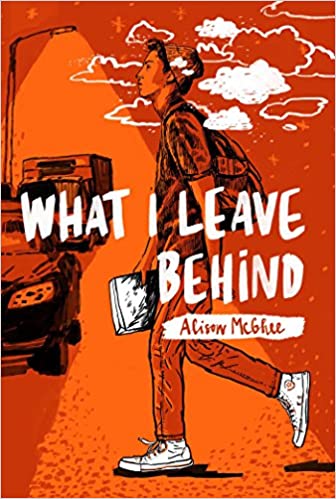What I Leave Behind by Alison McGhee
BookTrib is partnering with Bookish to bring you more great content. Alison McGhee’s young adult novel What I Leave Behind follows a teenage boy named Will as he attempts to make sense of tragedies in his life, the pain that his friends have experienced, and the struggles of others. The book is a deeply personal one for McGhee, and here she shares the story of how her own life and the girl she used to be helped to shape Will and his story.
Will, the star of my new book What I Leave Behind, is deeply familiar to me, maybe because he reminds me of myself at his age. Will is lonely, even though he’s loved by everyone who knows him. He absorbs the sadness and struggles of those around him. Will’s love for the people close to him is intense and encompassing, which is why he tries so hard to make sense of his father’s death by suicide and why he can’t bear to think of the pain his friend Playa is in after being raped at a party.
He wonders: If he had said the right thing to his dad, if he had only known what was on his dad’s mind, would his father still be alive? If he had been at the party, could he have prevented the rape?
One of the ways that Will tries to make sense of this senseless world is by walking. He walks and walks and walks the streets of his downtown L.A. neighborhood until he finds a rhythm that lets his thoughts roam free. It’s like meditation for him.
Like Will, I have walked my way through sorrow and grief that felt too big to handle. In my early twenties, I lost someone I adored to suicide. I tried to cope by dividing the days into fifteen-minute segments and walking my way through each one of them, miles and miles along the Charles River in Boston and then miles and miles back on the Cambridge side. Like Will, I had regulars on my route: the mean geese who chased me by the Hyatt, the homeless woman who slept under the bridge, and Kilt Man, a gigantic man in a kilt who must have walked as many miles as me, because I saw him everywhere.
What I didn’t know, and what Will is figuring out in What I Leave Behind, is that you can walk your way into a new way of living, in which your grief and confusion transform you into a person of enormous tenderness. Will sees the people in his world with such clarity and empathy that it hurts. There’s Superman, the homeless man who spends his nights with his back to the wall. There’s the boy he calls little dude, who waits patiently each afternoon for the butterflies to appear. There’s Major Tom, the manager of the Dollar Only store where Will works, whose social awkwardness pierces Will’s heart. There’s Playa, who has been Will’s friend since kindergarten. And there’s Will’s mom, who leaves him little notes when she works the overnight shift.
What I Leave Behind came to me in a rush. It felt like an obsession—I dreamed of Will, I woke up in the middle of the night thinking about him, I worked out passages of dialogue on my walks, I drove everyone around me crazy with my constant singing of “Space Oddity.”
In order to semi-contain the jumble of thoughts and ideas that swirl inside me when I’m writing, I often make up structural rules for my books, such as “all the characters’ ages must be multiples of three” and “you will end every third paragraph with a question.” These rules are random and arbitrary, but they help me give form to my internal chaos.
The rule I made up for What I Leave Behind was that the book would be made of passages containing one hundred words exactly. It’s a great artistic challenge to compress all the emotion and story and arc of a novel into one-hundred-word passages, but I thrive on great artistic challenges. Writing this book was like writing a series of poems all about one boy –Will—and the people who surround him. The brevity of the passages and the need to infuse them with profound emotion worked a kind of magic on me.
By the time the book was finished, I felt as if I had written a love letter to a girl I used to be, a girl haunted by all the ways she might have helped her lost friend. A girl who, like Will, was trying so hard to figure out what to do in the face of inescapable sorrow. She didn’t know she was walking herself into a new way of living, and neither does Will. But we do.
Writing this book cracked my heart open. I hope it makes others feel less alone.
Alison McGhee is the New York Times bestselling author of Someday, as well as Maybe a Fox, Firefly Hollow, Little Boy, So Many Days, Star Bright, A Very Brave Witch, and the Bink and Gollie books. Her other children’s books include All Rivers Flow to the Sea, Countdown to Kindergarten, and Snap. She lives in Minneapolis, Minnesota, and Laguna Beach, California.
Buy this Book!
Amazon




